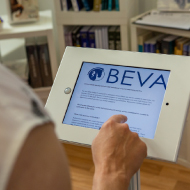
Association will offer practical advice during European Antibiotic Awareness Day
The British Equine Veterinary Association (BEVA) is lending its support to European Antibiotic Awareness Day (18 November) by offering practical advice to horse owners and improving understanding of antimicrobial resistance.
BEVA has added further practical elements to its PROTECT ME Toolkit and is conducting a survey to learn more about antimicrobial use and antimicrobial resistance in practice. The Equine Veterinary Journal - the official research publication of BEVA - is also set to publish a special online collection of previously published articles, Antimicrobials in an Age of Resistance.
BEVA President Tim Mair said: “While antimicrobials remain essential for the health and welfare of horses suffering from bacterial infection it’s imperative for vets to protect their usage to maintain their effectiveness for the future.
“The equine veterinary sector is committed to responsible stewardship; sales surveillance data shows that sales of horse only antibiotics has fallen by 4.3 tonnes (64 per cent) since 2017 and 13.6 tonnes (85 per cent) since 2014. We hope the results of the BEVA survey will provide further optimistic data.”
More than 260 veterinary professions have responded to BEVA’s Antimicrobial Use and Antimicrobial Resistance survey launched at BEVA Congress in September. The survey aims to assess any changes in prescribing of antimicrobials in equine practice since 2009 and to collect data on how antimicrobials are used by clinicians in equine practice.
BEVA’s PROTECT ME toolkit is a free resource for BEVA members which includes an array of tools to help educate horse owners about the importance of antimicrobial awareness.
On Monday (18 November), the organisation will launch three webinars on rational antimicrobial therapy and the need for antimicrobial stewardship. Furthermore, it has added a ‘No antibiotic prescription form’ to the Toolkit to help owners understand clearly when an antibiotic is not needed.
The EVJ’s special collection of nine online papers, edited by Jennifer Davis and Melissa Merca, will contribute to the knowledge of appropriate antimicrobial use in equine patients.



 The latest
The latest